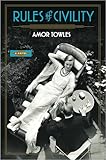 Rules of Civility is a great deal of fun. A gas! A lark! “Driver,” says secondary character Bitsy, “find Madison Avenue and start driving up it.” All the characters are snappy-talking New Yorkers. Rarely is a conversation had without cocktails.
Rules of Civility is a great deal of fun. A gas! A lark! “Driver,” says secondary character Bitsy, “find Madison Avenue and start driving up it.” All the characters are snappy-talking New Yorkers. Rarely is a conversation had without cocktails.
The novel tells the story of three people — boardinghouse roommates Katey Kontent and Eve Ross and the rich young banker, Tinker Grey, who they meet on New Year’s Eve. They become fast friends, due mainly to Eve’s lack of inhibition, and spend the whole of 1938 exacting large influence in each other’s lives.
Katey is the quieter, smarter of the girls, a daughter of Russian immigrants, always reading Dickens and having to borrow clothes to look stylish. Eve is the headstrong instigator of mischief who cut ties with her family in Indiana to climb the Manhattan social ladder. Tinker, the poor lamb, is exactly what both girls want — for Katey a serious, well-read young man who is easy to talk to, for Eve an eligible bachelor who will buy her dinner at The Explorers Club.
Before this love triangle can become a real problem, the three are in a car accident which leaves Tinker and Katey unscathed, but Eve with a scar and a bum leg. Because he was driving and feels responsible, Tinker has Eve move into his Upper West Side apartment for her rehabilitation, and Katey starts drifting out of their lives.
Katey narrates the novel in the past tense. From the novel’s opening, which takes place at a Walker Evans exhibition in the 60s, we know that she is happy and married and on the wealthy side, so her retelling of her volatile 20s is in a voice combining an outsider’s vulnerability and a veteran’s wisdom. It’s reminiscent of Fitzgerald or Waugh, in that “what gay parties we all had in those days, until our inner demons simply couldn’t be repressed any longer” vein.
The tone may border on nostalgic. Amor Towles describes 1930s clothes and equipage and restaurants like they’re all magical. The dialogue may border on caricature, such as this intoxicated party exchange:
Dicky bowed, knocking a glass of gin into Roberto’s lap.
—“Mon Dieu, Roberto! Be a little more fleet of foot, man!”
—“Fleet of foot? You’ve ruined another pair of khaki trousers.”
—“Come now. You’ve a lifetime supply.”
—“Whatever the state of my supply, I demand an apology.”
—“Then you shall have one!”
But neither tone, dialogue, nor characters ever fully fall into camp. Everything is balanced by Katey’s calm, and Towles’ tendency to inject these merry scenes with advice, like “be careful when choosing what you’re proud of — because the world has every intention of using it against you,” or “As a quick aside, let me observe that in moments of high emotion — whether they’re triggered by anger or envy, humiliation or resentment — if the next thing you’re going to say makes you feel better, then it’s probably the wrong thing to say.”
I find it fascinating that Amor Towles took on this particular subject and era. As I was reading, it was impossible to forget that the book is a 47-year-old investment banker’s debut novel. In an interview, he said, “I prefer to put myself in an environment that’s farther afield and look through the eyes of someone who differs from me in age, ethnicity, gender and/or social class. I think a little displacement makes me a sharper observer.” And yet, Towles doesn’t relish giving Katey girl friends. Besides Eve, Katey spends most of the book talking to men.
Observation is certainly Katey’s greatest gift. “The couples at the tables around us were engaged in conversations they’d been having for years,” she says, when Tinker takes her out for dinner. She spends the book bouncing back and forth between upper and lower class Manhattan. She doesn’t have Eve’s social ambition, but she does get around. Unmoored for a while from Tinker and Eve’s dominating personalities, she comes into her own.
Rules of Civility takes its name from the famous guide to decorum that George Washington copied down as a young man, which Tinker keeps with him. The novel examines how, by changing your attitudes, behaviors, and manners, you can reinvent yourself, and how Katey, Tinker, and Eve all did this in 1938. When Katey admires a sales clerk’s red hair, the clerk replies, “If I may be so bold, Miss Kontent, the color of my hair is available to you on the second floor.” In 1938 New York, it would seem that everything was available to you if you knew where to find it, how to dress, and how to hold your liquor.








